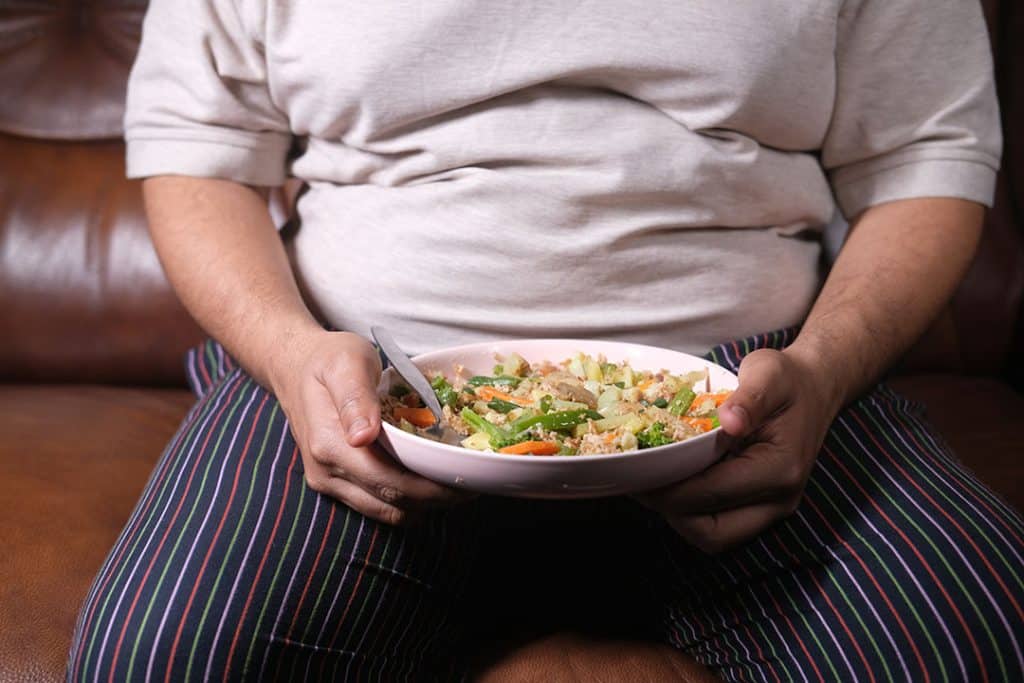Insulin resistance has been a hot topic with the new weight loss drugs hitting the market. But inflammation also plays a factor in weight gain.
If you’re tired of being on the weight loss rollercoaster despite all your best efforts, you’re not alone. Studies show that almost half of all American adults attempt to lose weight in some way every year.
Trying new diets and exercise programs and getting minimal results isn’t just frustrating. It also holds you back from making real improvement and living life as a healthier version of yourself.
Losing weight should be simple – burn more calories than you consume. But in reality, it’s far from easy. So why is losing weight so hard?
The root cause of stubborn weight gain often lies in a hidden connection between two key players: inflammation and insulin resistance. Understanding and managing these underlying factors holistically could be your key to unlocking better health and achieving sustainable weight loss.
Struggling to Lose Weight? Quick-Fixes Aren’t the Answer

With the rising popularity of weight loss “quick fixes” (like Ozempic), it’s clear that many people are desperate for a solution to their weight issues.
These medications, originally developed for managing diabetes, have been touted as miracle solutions for weight loss. They promise rapid results with minimal effort, which can be incredibly appealing – especially after traditional methods, such as diet and exercise, haven’t worked.
However, these shots aren’t actually approved for weight loss. They also fail to address the underlying issues that are really causing your weight gain. When the medication is stopped, weight often returns. The reason for this? The underlying issues causing the weight gain—such as hormonal imbalances and poor metabolic health—remain unaddressed. On top of that, these medication also have side effects. This includes nausea, digestive issues, and even more serious health risks.
Getting to the Root of the Weight Gain Problem
Weight gain isn’t just about what you eat and how much you exercise. And while some medications can suppress your body’s natural appetite or force-correct your hormone balance temporarily, they aren’t helping you develop fit and healthy habits to last your lifetime.
So, what’s really at the root? It varies from person to person, but insulin resistance and inflammation are common culprits in the fight against stubborn fat. These two issues are deeply interconnected and work together to trigger fat storage and weight gain.
Let’s take a closer look to understand why, and what you can do to reverse this cycle.
The Inflammation-Insulin Resistance-Weight Gain Cycle

The inflammation-insulin resistance-weight gain cycle is a seemingly endless loop of health issues that ultimately train the body to store fat, making weight loss feel impossible. It’s like trying to climb a muddy hill during a rainstorm. Every step you take forward, the mud pulls you back and the rain makes the ground ahead even more slippery.
This vicious cycle is similar to what happens inside the body when there are root issues of inflammation, insulin resistance, and weight gain at play. Understanding this cycle can be the key to unlocking a healthier, more sustainable approach to weight loss and a healthier future.
Understanding Inflammation
Inflammation is the body’s natural response to injury or infection. In many cases, inflammation is a good thing that helps protect and heal a damaged part of the body. But when it becomes chronic, the benefits of inflammation quickly fall by the wayside. This is when the negative effects begin to wreak havoc on your health.
What kinds of negative effects? Persistent inflammation can disrupt your hormone balance, impair your metabolism, and lead to more weight gain (among many other things). When your body is in a constant state of inflammation, it releases cytokines — chemicals that interfere with insulin signaling and promote fat storage. This creates a cycle where inflammation leads to insulin resistance and weight gain, which in turn exacerbate inflammation.
Understanding Insulin Resistance
Insulin is a hormone that regulates blood sugar levels by encouraging glucose to move from the blood to the cells for energy. Insulin resistance occurs when our body’s cells become less responsive to insulin. They fail to get the “message” to take up glucose into the cells, leaving high levels of sugar to accumulate in the bloodstream. This condition is a major precursor to type 2 diabetes and is closely linked to weight gain.
Several factors contribute to insulin resistance, including a high-sugar/highly-processed diet, lack of exercise, and, as we saw above, chronic inflammation. When the body is inflamed, it releases substances that hinder insulin’s effectiveness, making it harder to regulate blood sugar levels and increasing the likelihood of weight gain.
But it goes both ways – insulin resistance can also trigger inflammation. When insulin resistance occurs, the body compensates by producing more insulin in an attempt to manage blood sugar levels. However, elevated insulin levels can promote the production of pro-inflammatory substances like cytokines that increase inflammation throughout the body. This chronic inflammation further disrupts insulin signaling, exacerbating insulin resistance and weight gain.
Unfortunately, the cycle doesn’t stop there. The excess glucose in the bloodstream can then cause oxidative stress, a condition that damages cells and triggers even more inflammatory responses.
The Weight Gain Cycle
When inflammation and insulin resistance occur together, they create a harmful feedback loop that can be difficult to break. Chronic inflammation impairs insulin signaling, leading to higher blood sugar levels and increased fat storage. The excess fat, particularly around the abdomen, further fuels inflammation, perpetuating the cycle.
Insulin resistance not only makes it difficult to lose weight but also promotes weight gain. When cells don’t respond properly to insulin, the body compensates by producing even more insulin. These elevated insulin levels increase the body’s fat storage, especially in the abdominal area, leading to weight gain and obesity. Insulin resistance can also make you feel hungrier and crave sugary, high-carb foods – no wonder it feels like such an uphill battle!
Beyond simple weight gain, this cycle also has some serious implications for your overall health. Those with insulin resistance and inflammation are at a high risk of developing chronic diseases such as type 2 diabetes, cardiovascular disease, and metabolic syndrome.
Breaking this cycle may seem impossible, but it’s simply about helping your body return to a natural state of balance. With help from a qualified care team with a strategic, holistic approach, you’ll be on your way to a healthier weight – for good.
7 Strategies to Break the Weight Gain Cycle

Losing weight when you have hormonal imbalance complicated by inflammation is possible with the right lifestyle changes. Through habits like functional nutrition, chiropractic care, and supplements, you can guide your body back into a balanced state of health where weight loss happens easily and sustainably – no shots required.
1) Eat a Healthy, Weight Gain Cycle-Breaking Diet
Each meal offers a way to either help or hurt your body’s balance. This is why eating an anti-inflammatory diet is one of the most powerful steps you can take to reduce inflammation and improve insulin sensitivity. Aiming for a diet rich in whole foods, fruits, vegetables, lean proteins, and healthy fats provides essential nutrients that support overall health and help regulate hormonal balance. Fill your plate with…
> Whole Foods
Whole foods (rather than processed foods) are packed with vitamins, minerals, fiber, and antioxidants that are crucial for overall health and weight management. These nutrient-dense foods provide the body with the raw materials it needs to produce hormones efficiently, including insulin. Foods high in magnesium, such as leafy greens, nuts, and seeds, are especially known to improve insulin sensitivity. Similarly, omega-3 fatty acids found in fatty fish, flaxseeds, and walnuts have anti-inflammatory properties that can help lower systemic inflammation.
> Fruits and Vegetables
These are loaded with antioxidants and phytonutrients that combat oxidative stress and inflammation. Berries, for example, contain flavonoids that have been shown to reduce inflammation and improve insulin sensitivity. Greens like spinach, kale, or spirulina are high in fiber and micronutrients. They support metabolic health and help stabilize blood sugar levels.
> Lean Proteins
Incorporating lean proteins such as chicken, turkey, fish, and plant-based proteins like beans and legumes helps maintain muscle mass and supports metabolic function (i.e. faster calorie burning potential!). Proteins are also important for the production of enzymes and hormones. Consuming enough protein not only keeps you energized for exercise and muscle repair, but can help regulate blood sugar levels and reduce the spikes and crashes that contribute to insulin resistance.
> Healthy Fats
Healthy fats, particularly monounsaturated and polyunsaturated fats found in avocados, nuts, seeds, and olive oil, are fantastic allies for reducing inflammation. These fats support cell membrane health which allows cells to respond better to insulin. They also help regulate the production of hormones involved in metabolism and appetite control, such as leptin and ghrelin.
> Fiber-Rich Foods
Foods high in fiber, such as whole grains, legumes, fruits, and vegetables, help slow the absorption of sugar into the bloodstream. This not only helps you feel satiated for longer, but prevents blood sugar spikes and promotes insulin sensitivity. Fiber also supports a healthy gut microbiome, which is increasingly recognized as important for reducing inflammation and supporting metabolic health.
> Hydration
Staying well-hydrated is essential for healthy weight loss and hormone balance. Water supports all bodily functions, including the metabolism of glucose and the detoxification processes that reduce inflammation. Avoid sugary drinks and opt for plain water, herbal teas, or fruit infusions (like lemon water).
> Avoid Processed Foods and Sugary Snacks
Eating processed foods, sugary snacks, and refined carbohydrates is a recipe for inflammation and insulin resistance. These foods often contain high levels of sugar, unhealthy fats, and additives that trigger inflammatory responses in the body. They can also cause rapid spikes in blood sugar levels, leading to increased insulin production and subsequent insulin resistance. Opt for healthier sweet treat alternatives.
2) Find Physical Activities You Enjoy – And Do Them Often
t’s no surprise that exercise is essential for weight loss. Beyond burning calories, when you exercise, your muscles use glucose for energy, lowering blood sugar levels and reducing the need for insulin. This helps your cells become more responsive to insulin, improving insulin sensitivity. Exercise also reduces levels of inflammatory markers in the bloodstream, breaking the cycle of inflammation and insulin resistance.
Exercise of any kind will help, but there is a more strategic way to go about it. For best results, aim for at least 150 minutes of moderate-intensity aerobic exercise per week. This could include walking, cycling, HIIT, or swimming. You should also try to incorporate strength training exercises at least twice a week.
If you’re not excited about the prospect of more exercise, you’re not alone! Many people don’t feel motivated to workout, especially when they don’t feel like their best selves. But, the key to maintaining a consistent exercise routine is finding activities you genuinely enjoy. Whether it’s dancing, hiking, playing a sport, or walking your way to weight loss, enjoying your workout increases the likelihood of sticking with it long-term. Here are a few tips to help you stick with it: 1) Mix up your routine to keep it interesting. 2) Set realistic goals. 3) Consider working out with a friend for added motivation and accountability.
3) Take on Hormone-Balancing Habits
Beyond diet and exercise, how you live the rest of your day (and night) can make a huge difference in getting insulin balance and inflammation under control. Two key areas to work on are sleep and stress relief.
When you don’t get enough sleep, your body produces higher levels of stress hormones like cortisol. This not only disrupts your sleep cycles going forward, but can lead to increased inflammation and insulin resistance. Aim for 7-9 hours of quality sleep each night to allow your body to repair and regenerate, supporting overall health and weight management.
If you’re one of the millions of Americans who struggle to fall asleep, however, this could be much easier said than done. To reset your sleep, create a relaxing bedtime routine, keep a consistent sleep schedule, and make your sleep environment comfortable and free from distractions. Limit exposure to screens before bed, as the blue light emitted by phones and computers can interfere with your ability to fall asleep. Instead, engage in calming activities such as reading, taking a warm bath, using an herbal remedy, or practicing gentle stretches.
Managing stress during the day is just as important for reducing inflammation and maintaining hormonal balance as your nighttime rest. Chronic stress triggers the release of cortisol, which can disrupt your metabolism, increase fat storage, and lead to weight gain. Incorporate stress-reducing techniques into your daily routine, such as meditation, yoga, or deep breathing exercises. These practices can help calm your mind, lower cortisol levels, and improve your overall sense of well-being.
Like exercise, many people find managing stress to be just another chore to add to the to-do list. But it can – and should! – be something you look forward to. Try to find the activities that help you relax and unwind without much effort. For some this may be a slow walk in nature, doing a hobby, taking a bath, or spending time with a loved one.
4) Get a Food Sensitivity Test
For some people, certain foods (even “healthy ones”) can be at the root of stubborn weight gain. If you have a sensitivity to a certain food, they can trigger inflammation which will exacerbate conditions like insulin resistance and weight gain.
So, how do you know if you have a food sensitivity? Taking a food sensitivity test can help identify any foods that are causing these reactions. Common culprits are dairy, gluten, soy, or certain nuts and grains, but any food can cause a sensitivity.
Once you’ve identified problematic foods, your nutritionist can help you follow an elimination diet to remove them from your diet and observe how your body responds.
While removing foods from your diet is rarely fun, this process can lead to improvements in energy levels, digestion, skin health, and overall well-being. You’ll significantly reduce inflammation, making weight management and staying on top of your health much easier.
5) Get Functional Nutrition Lab Testing
For a more comprehensive approach to planning your weight loss meal plan, consider a functional nutrition strategy. Functional nutrition goes beyond one-size-fits-all recommendations and looks at your body’s data to develop a made-for-you nutrition plan.
We start with functional lab tests that can reveal any underlying nutrient deficiencies and pinpoint other issues contributing to your weight gain (including insulin resistance and inflammation). For instance, low magnesium levels are often associated with insulin resistance. By identifying and addressing these deficiencies through targeted meal plans and supplements, you can start shedding the extra pounds and enjoy more energy.
6) Start a Strategic Supplement Plan
While we don’t recommend diet pills or “quick fix” medicines, supplements that support your body’s natural weight management processes can be incredibly effective. These supplements can help improve your metabolism, nutrient deficiencies, and boost your energy. While everyone’s supplement plan is based on their unique needs, these trusted supplements are typically beneficial for anyone struggling with their weight:
> Aceva Triple Mag
Triple Mag is a powerful supplement that provides magnesium in three highly absorbable forms to address magnesium deficiencies commonly linked to insulin resistance and food cravings.
> Aceva Sugar Balance
Sugar Balance contains a blend of herbs and nutrients designed to support healthy blood sugar metabolism. This supplement is a game-changer for those with insulin resistance or prediabetes-related weight gain.
7) Regular Chiropractic Care
Who would think that a trip to your chiropractor could help sort out that nagging pain in your back and your weight loss woes?
It’s true – chiropractic care is an excellent therapy for managing inflammation and improving overall wellness. By aligning the spine and improving nervous system function, chiropractic care can reduce the body’s inflammatory response and promote better communication between the brain and body.
Regular chiropractic adjustments can also help reduce pain, boost energy, and support mobility so you can take on your favorite workouts with ease. As inflammation decreases and mobility improves, you will enjoy exercise more and be able to keep a more consistent workout schedule while enhancing your metabolism.
Stop the Cycle and Start Your Healthier Life with AlignLife

The inflammation-insulin resistance-weight gain cycle can be a complex puzzle to solve, but it’s not unbreakable. Anyone can break free from this cycle and settle into their goal weight with an aligned, holistic approach.
At AlignLife, we’re dedicated to helping you on your weight loss journey with personalized care and comprehensive strategies designed to address your unique needs. From chiropractic care to functional nutrition to a tailored weight management program, our team is here to help you tackle the root issues and take the best next steps forward.
You don’t have to struggle with your weight any longer. Find your nearest AlignLife Center and get started on a weight loss plan that works for you today!



